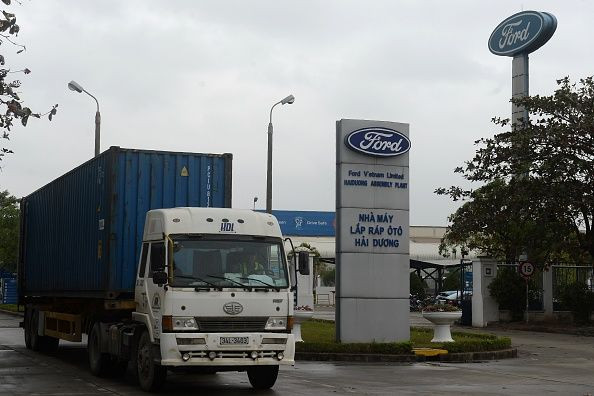Why Ford Teamed Up With Walmart To Test Self-Driving Deliveries

Ford Motor Company (NYSE:F) and urban delivery start-up Postmates are teaming up with Walmart (NYSE:WMT) to test a delivery service for Walmart customers using prototype self-driving Ford vehicles, Ford announced on Wednesday.
This article originally appeared in The Motley Fool.
Ford has been testing autonomous commercial delivery vehicles together with Postmates in the Miami area since February. The automaker has said that it plans to begin producing fully self-driving vehicles for commercial customers in 2021.
About the new Ford-Walmart deal
Walmart has joined an existing pilot program that Ford and Postmates began in June. In that pilot, Ford vehicles that have been modified to look like they're self-driving (but that actually have human drivers on board) have been making deliveries for Postmates' customers in Miami and Miami Beach.
Today's announcement is that Walmart, which already uses Postmates for deliveries in the Miami area, has agreed to join that pilot program. Brian Wolf, director of business development for Ford's autonomous-vehicle subsidiary, explained in a Medium post how Ford and Walmart will begin working together:
Over the next couple of months, we'll be working closely with Walmart to understand its operations, identify what goods we can feasibly transport, and pinpoint any issues that may need to be addressed to successfully deliver orders via self-driving vehicles. Naturally, orders from a supermarket will tend to be larger and more varied than orders from a restaurant or dry cleaner. So we'll be exploring different vehicle configurations or modifications that we could make to meet people's needs -- especially to accommodate perishable goods, or scenarios where our vehicles end up making multiple deliveries on a single trip.
Wait. These aren't real self-driving vehicles?
They're not, but hang on. The idea of a fake self-driving delivery van may sound silly, but there's some important research being done.
Like a similar pilot program that Ford is conducting with Domino's Pizza (NYSE:DPZ), the Postmates pilot has been testing how humans interact with an automated delivery vehicle, and specifically testing a variety of human-vehicle interfaces. The engineers and designers working on Ford's actual upcoming self-driving commercial vehicle will use the data from these tests to help them design interfaces for a variety of commercial applications.
What does Ford get out of adding Walmart to this test?
That's easy. Ford is planning to begin mass production of its self-driving commercial vehicles in 2021, and it would like to sell a lot of them. Bringing Walmart into this test now will put Ford in a very good position to offer the retail giant a series of vehicles tailored to its needs once production begins. Given Walmart's scale, this pilot could lead to a very large order for Ford's commercial-fleet business.
While there are lots of efforts underway to develop self-driving vehicles, most to date appear to be focused on taxi services. Ford, with its leading position in (human-driven) commercial vehicles, is well-positioned to stake out a significant share of the self-driving commercial-vehicle market that is expected to emerge over the next several years.
What does Walmart get out of this?
Walmart is clearly worried about one very large competitor: Amazon.com (NASDAQ:AMZN), which has been working aggressively to lower the cost of making deliveries to its retail customers.
Specifically, both companies have focused on reducing the cost of the "last mile," the final stage of a delivery from a shipping hub to a customer's home or office -- which accounts for a large portion of the total cost of shipping. In theory, once the technology is mature, an automated delivery vehicle should cost considerably less per delivery than a van driven by a human.
Deliveries by automated vehicles are uncharted territory, for Walmart and everyone else, of course. Given that, it's not hard to see what Walmart is hoping to get out of this test with Ford and Postmates: a clearer view into how self-driving commercial vehicles could work with -- and benefit -- its business.
While this is just a pilot program, it could lead to a nice piece of business for Ford -- and a significant advance for Walmart.
John Mackey, CEO of Whole Foods Market, an Amazon subsidiary, is a member of The Motley Fool's board of directors. John Rosevear owns shares of Amazon and Ford. The Motley Fool owns shares of and recommends Amazon. The Motley Fool recommends Ford. The Motley Fool has a disclosure policy.




















